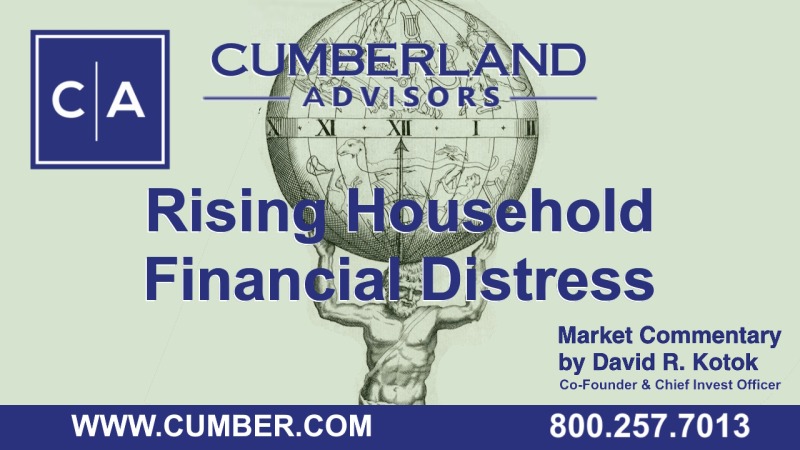“…the incidence of household financial distress has increased for the most common types of debts. For credit card debt and auto loans, the incidence has reached high levels, equal or close to those during the Great Recession.”
“Share of Americans in Financial Distress Reaches High Levels,” St. Louis Fed research report, December 26, 2023, https://www.stlouisfed.org/on-the-economy/2023/dec/share-americans-financial-distress-reaches-high-levels. Hat tip to Rick Newman (Yahoo Finance) for discussing this research paper.
I’m advising readers to spend a few minutes reading the entire paper. Note how the macroeconomic ratios dealing with total wealth don’t capture the financial distress metric. As the authors note: “this measures the percentage of individuals experiencing distress, not distressed debt as a percentage of total debt, which still remains relatively low.”
That is not a surprise to us.
In my forthcoming book, my co-authors and I examine these outcomes in history where the economy rebounds after a pandemic shock. There are fewer people. So, per capita wealth goes up as wealth is redistributed among the survivors. There is a shift in demand, so that the least productive enterprises fail. Thus, per capita productivity goes up. History suggests that, after the first shock of inflation adjustment, inflation subsequently subsides.
Our research confirms what others have found: the neutral real interest rate goes down in this scenario. We expect that to occur during the rest of this decade. Remember, that is the neutral “real” interest rate, not the nominal rate. The nominal interest rate is observable every day at any maturity one selects. The real interest rate estimation requires an inflation adjustment or an inflation expectations adjustment of the nominal rate. Today, we can use various futures contracts on inflation or TIPS’ market pricing to estimate the real rate for the United States.
In post-pandemic periods, the implication is that the wealth divide among the population of survivors widens. That is what we see in many countries around the world as we review them today. That is what you get when the pandemic is global. In almost every country, the surviving rich get richer as each dead person’s wealth is redistributed among the inheriting survivors of the deceased person’s household. The poor have little participation in the redistribution. That is why the incidence of household distress increases even as the aggregate of wealth increases.
And, as in previous episodes in history, we are witnessing coincident disruptions in governance, with a surge in demagoguery and various states of war. That was true after the plague hit Athens in year one of the Peloponnesian War (as documented by Thucydides). That was true during the several plagues that crippled the Roman Empire. That was true in the 17th century among the Italian city states. That was true in the period of the Spanish Flu coincident with World War 1.
In my opinion, it is true today.
We remain nearly fully invested in the US Equity ETF portfolio. We are overweight the defense-aerospace sector.
We believe the post-pandemic warlike behavior that is observed throughout history is repeating itself in a modern, global version. We expect there will be more of it, which is why we continue the defense sector position.
Links to other websites or electronic media controlled or offered by Third-Parties (non-affiliates of Cumberland Advisors) are provided only as a reference and courtesy to our users. Cumberland Advisors has no control over such websites, does not recommend or endorse any opinions, ideas, products, information, or content of such sites, and makes no warranties as to the accuracy, completeness, reliability or suitability of their content. Cumberland Advisors hereby disclaims liability for any information, materials, products or services posted or offered at any of the Third-Party websites. The Third-Party may have a privacy and/or security policy different from that of Cumberland Advisors. Therefore, please refer to the specific privacy and security policies of the Third-Party when accessing their websites.
Sign up for our FREE Cumberland Market Commentaries
Cumberland Advisors Market Commentaries offer insights and analysis on upcoming, important economic issues that potentially impact global financial markets. Our team shares their thinking on global economic developments, market news and other factors that often influence investment opportunities and strategies.


